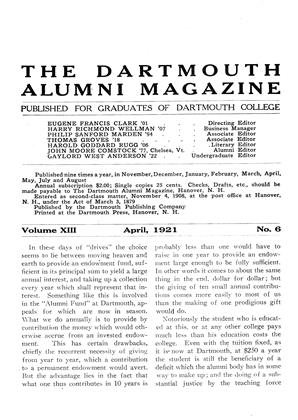The report recently issued by the Continental Division of The American University Union in Europe contains several items of interest to college men in the United States. The Union was founded in 1917 to meet first the war needs of American University and College men in Europe and, after the war, to meet the needs of American students abroad. It now devotes all its time to the second of these purposes with its Continental Division established on the Luxembourg Garden, in the Latin Quarter of Paris, within easy reach of the Sorbonne and the most important Parisian institutions of learning.
The growth of this division is seen in the registration figures for 1919 and 1920. In November of the former year 61 students were registered and the number had increased last June to 257. By January of the present year 380 of the 472 American students in France were registered at the Union, and the quarters now occupied are hardly sufficient for the present needs. These students registered at the Continental Division represent 104 American universities and colleges and come from 41 different states and the District of Columbia.
The purposes and activities of the Union named in the report are (1) A Bureau of Information, (a) for American professors and students in France, (b) for French professors and students in France; (2) A center andworkshop for American students, and (3) AnOrganization Co-operating with the French forFranco-American Educational Adjustments. The essential business of the Union has been to encourage American students to study abroad, to look after their welfare in France, and to be as serviceable as possible in furthering educational relations between France and the United States.
A library containing a full collection of documents concerning French institutions of learning, and the catalogues and other publications of American institutions is maintained at the Union headquarters and puts information in regard to study easily at the disposal of those desiring it. Tutoring and other kinds of work are often put in the way of students with slender financial resources. The Union also affords a kind of workshop, of writing room and library with books and American reviews and papers, and a study frequented by American professors and students, where typewriters are at the disposal of those who wish to use them. The principal aim of the Union, however, has been to launch students into French life and encourage relations with French people.
Throughout the academic year there are reunions and dances. At the former, addresses are made by distinguished Frenchmen and are planned to orient students promptly in Paris. Men connected with the museums of Paris, with the French press, and the contemporary French theatre, literature, and political parties have spoken at the Union this year, among them M. Andre Tardieu, M. Jacques Copeau, director of the Theatre du Vieux Columbier; M. Appell, rector of the University (and Academy) of Paris; M. Stéphane Lauzanne, editor of Le Matin, and M. Bénédite, Conservateur of the Luxembourg and Rodin Museums. The attendance at these reunions has ranged from 80 to 300 persons. The dances to which French young people, as well as American students, are invited have been very popular.
 View Full Issue
View Full Issue
More From This Issue
-
 Article
ArticlePEN AND CAMERA SKETCHES OF HANOVER AND THE COLLEGE BEFORE THE CENTENNIAL
April 1921 By EDWIN J. BARTLETT '72 -
 Article
ArticleIn these days of "drives" the choice seems
April 1921 -
 Article
ArticleFRESHMAN MENTAL TESTS
April 1921 By CHARLES LEONARD STONE '17 -
 Sports
SportsBASKETBALL
April 1921 -
 Article
ArticleAMERICAN PROFESSORS AND STUDENTS RESENT CHARGES AGAINST FRENCH PEOPLE
April 1921 -
 Class Notes
Class NotesCLASS OF 1910
April 1921 By Whitney H. Eastman
Article
-
 Article
ArticleFRESHMEN WIN RUSH
October 1936 -
 Article
ArticleGeneral Services Regional Director
March 1956 -
 Article
ArticleContinuing Education
NOVEMBER 1970 -
 Article
ArticleCrossing Party Lines
NOVEMBER 1993 -
 Article
ArticleRELATION TO OTHER SUBJECTS
AUGUST 1929 By Professor Wilbur M. Urban -
 Article
ArticleLENDING NEIGHBORS A HAND
January 1936 By W. J. Minsch Jr. '36


